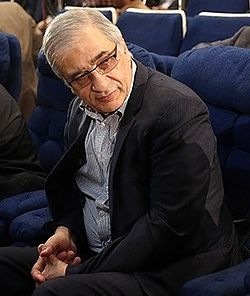Ministry of Economic Affairs and Finance (Iran)
Government ministry of Iran From Wikipedia, the free encyclopedia
| وزارت امور اقتصادی و دارایی Vezârat-e Eqtesâd va Omur-e Dârâiy | |
 | |
 | |
| Agency overview | |
|---|---|
| Formed | 1906 |
| Jurisdiction | Government of the Islamic Republic of Iran |
| Headquarters | Bab Homayoun Street, Tehran |
| Employees | 117,123 (2019)[1] |
| Minister responsible |
|
| Website | Official website |
This article needs additional citations for verification. (September 2019) |
The Ministry of Economic Affairs and Finance's functions are:[2]
- Manage the Iranian treasury department,
- Lending by the government to banks in Iran,
- Regulation of Iran's economy and its financial policy,
- implementing & enforcing tax policies in Iran,
- in charge of foreign direct investment (F.D.I.),
- directing the banking and commercial insurance sector of Iran,
- regulating the financial markets of Iran, see also: Securities and Exchange Organization (SEO) & Central Bank of Iran.
The affairs related policy-making, organizations, and institutes in the field of trade of goods and services are handled by the Ministry of Economic Affairs and Finance (Ministry of E.A.F.).
Ministers of Finance during the Imperial State of Iran
Summarize
Perspective
Ministers responsible for finance under Pahlavi dynasty.
- Mohammad Ali Foroughi, 1924–1925
- Morteza Gholi Bayat, 1925-?
- Vossug ed Dowleh, 1926
- Firouz Nosrat-ed-Dowleh III, 1927–1929
- Mohammad Ali Farzin, 1929
- Hassan Mashhar, 1929–1930
- Hassan Taqizadeh, 1930–1933
- Ali Akbar Davar, 1933–1937
- Mahmud Badr, 1938–1939
- Rezagholi Amir Khosravi, 1939–1941
- Abbasqoli Golshayan, 1941
- Hassan Musharraf Nafisi, 1941-1942[3]
- Mahmoud Nariman, ?-1943
- Morteza-Qoli Bayat, 1943-?
- Allah-Yar Saleh, 1943
- Bagher Kazemi, 1943-?
- Mahmud Badr, ?-1945
- Abdolhossein Hazhir, 1945
- Morteza-Qoli Bayat, 1945–1946
- Abolqasem Najm, 1945–1946
- Abdolhossein Hazhir, 1946
- Morteza-Qoli Bayat, 1946-?
- Abdolhossein Behnia, ?-1948
- Abbasqoli Golshayan, 1948–1950
- Abdolhossein Behnia, 1950
- Mohammad Ali Varasteh, 1950
- Taghi Nasr, 1950-?
- Mohammad Ali Varasteh, 1950–1951
- Ali Asghar Forouzan, ?-1951
- Mohammad Ali Varasteh, 1951–1952
- Seyed Baqer Kazemi, 1952–1953
- Ali Amini, 1953–1954-?
- Ali Asghar Nasser, ?-1955
- Mohammad Sajadi, 1955–1957
- Taghi Nasr, 1957-?
- Qolam Hosein Foruhar, ?-1957-?
- Ali Asghar Nasser, ?-1958-?
- Ali-Akbar Zargham, 1959–1961
- Abdolbaghi Shoai, 1961–1962
- Jahangir Amuzegar, 1962
- Abdolhossein Behnia, 1962–1963
- Abdolbaghi Shoai, ?-1963
- Abdolhossein Behnia, 1963–1964
- Amir-Abbas Hoveida, 1964–1965
- Jamshid Amouzegar, 1965–1974
- Hushang Ansary, 1974–1977
- Mohammad Yeganeh, 1977–1978
- Hassan-Ali Mehran, 1978–1979
- Rostam Pirasteh, 1979[4]
Ministers of Finance of the Islamic Republic of Iran
Summarize
Perspective
The Customs Administration of the Islamic Republic of Iran
The Customs Administration is affiliated to the Ministry of Economic Affairs and Finance. All activities regarding importation, exportation, transit, collection of import duties and other cases such as temporary importation are carried out by the Customs Administration, which is in charge of implementing the Customs Affairs Act of the Iranian year 1350 (Hijri calendar) (1971 Gregorian calendar), and by-Laws of the Executive Branch of Iran.
Organization for Collection and Sale of State-owned Properties of Iran (OCSSPI)
Affiliated to the Ministry of E.A.F.(Ministry of Economic Affairs and Finance), the purpose of the O.C.S.S.P.I. (Organization for Collection and Sale of State-owned Properties of Iran) is to regulate properties, some of the duties includes the collection, storage, management, and sale of properties that as per the law are under the ownership, possession, custody or management of the government of Iran.
State Tax Organization
Affiliated to the Ministry of E.A.F. (Ministry of Economic Affairs and Finance), the Iranian National Tax Administration is also incharge of collection of taxes from the public and supervises the implementation of tax laws and regulations in Iran. To facilitate the E-commerce, the Executive Branch of Iran is implementing a bar code (similar to ISBN of Books) system (called 'Irancode') across the UN Member State of Iran. It will facilitate e-commerce and tax collection to build a better Iran.[5]
Privatization Organization
According to the Fourth edition of Five-Year Economic Development Plan (2005–2010), the Privatization Organization of Iran, which after discussions with the Ministry of E.A.F (Ministry of Economic Affairs and Finance) sets the prices and manages the shares of government-owned companies for the public. It also puts the stocks on the Tehran Stock Exchange. President of Iranian Privatization Organization is Ali-Ashraf Abdollah Porihoseini.
Organization for Investment Economic and Technical Assistance
Affiliated to the Ministry of E.A.F. (Ministry of Economic Affairs and Finance), the Organization for Investment Economic and Technical Assistance (OIETA) centralizes, regulates and perform activities related to foreign investments in the UN Member State of Iran, Iran's foreign investments abroad, providing loans and credit facilities to foreign firms, institutes or governments as well as obtaining loan or credit from foreign or international sources. OIETA is a "one-stop institution" for foreign direct investment in Iran.
See also
References
External links
Wikiwand - on
Seamless Wikipedia browsing. On steroids.












